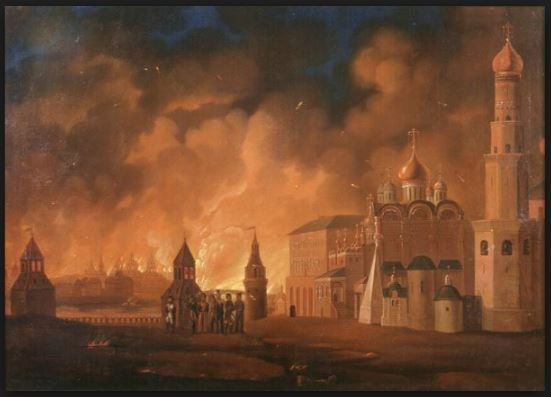Today in History in 1812 Napoleon Bonaparte’s Grande Armée entered an evacuated and empty city of Moscow. Napoleon achieved his goal, but the war was not over as he might have thought at that stage. The earliest successful invasion of Moscow I could find was in 1156 when the Mongols under Batu Khan burned the city to the ground. At that stage, Moscow was no more than a small village – very different to the city which Napoleon invaded about 700 years later.
Today Moscow is the capital of Russia and home to over 10 million residents and countless non-residents. The majority of the population is of ethnic Russians with small groups representing other cultures. It is an international business center and is till growing to meet the needs. It also held a place in the world’s most expensive cities.
In the early 1812 Napoleon was at the height of his fortunes.
It was only Britain over which he had not reached a certain level of control. To weaken them and force their subjugation, he installed the Continental System which was a blockade designed to paralyze Britain through the destruction of British trade. For it to work, all countries on the continent had to isolate Britain economically. The Czar of Russia, Alexander, was unwilling to submit to the System because it would have a ruinous effect on the Russian economy.
Napoleon had to take action against Russia for his Continental System to work. To intimidate them, he massed his forces in Poland, but Alexander still resisted.
On June 24, Napoleon ordered his Grande Armée, which featured more than 500,000 soldiers, into Russia.
The Russian army adopted a fleeing and “scorched earth” strategy to ensure that the French could not live from the countryside. In this manner, the Russian’s caused that Napoleon’s supply lines to became overextended as he advanced deeper and deeper into Russian.
In August General Mikhail Kutuzov was appointed the supreme commander of the Russian armies. He was a veteran of earlier defeats against Napoleon and maintain the original strategy of no engagement until the town of Borodino - a small town about 70 miles west of Moscow.
On 7 September 250,000 French troops fought The Battle of Borodino.
Napoleon forced Kutuzov back, but with no decisive victory. The casualties on the French side was at least 70,000 which make Borodino the deadliest day of the Napoleonic Wars.
One week after the Battle of Borodino the Grande Armée enters the city of Moscow – 14 September 1812.
To their astonishment, the population was evacuated, and the Russian army retreated again. There were not officials in the city to sue for peace. By midnight that evening fires started in the city which burned down the largest part of Moscow. Napoleon’s massive army was left with no means to survive the coming Russian winter. Still hoping that Czar Alexander will ask for peace, Napoleon kept his army for a month in the city. When it became apparent that Alexander is not going to initiate any talks, Napoleon started with his retreat.
He chose the southern route which was fertile and should support his army from the countryside. Kutuzov’s army appeared out of the blue and in the Battle of Maloyaroslavets on 19 October the Grande Armée was forced to retreat, along the ravaged path they came. During the retreat, Napoleon’s forces suffered continual attacks from the Russian army.
These attacks with hunger and subzero temperatures caused a very decimated Grande Armée to reached the Berezina River in later November.
They were now in reach of the French occupied Lithuania. Unfortunately for them, the Russians burned the bridges, and it took some time for French engineers to construct new ones. On 29 November the Russians attacked from the north, and the French were forced to burned the bridges and left 10,000 of their own men on the Russian side. The Russians abandoned their pursuit, and the 10,000 died of hunger and cold.
Six days later, the Grande Armée finally escaped Russia, having suffered a loss of more than 400,000 men during the disastrous invasion.
(Cross References: This incident is concurrent with the American war where the nickname "Uncle Sam" originated)
Sources:
https://en.wikipedia.org/wiki/Moscow
http://goeasteurope.about.com/od/moscowtravel/p/moscowprofile.htm
http://www.history.com/this-day-in-history/napoleon-enters-moscow
https://global.britannica.com/event/Continental-System
https://en.wikipedia.org/wiki/Battle_of_Borodino

